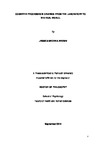Cognitive Processes in Craving: From the Laboratory to the Real World.
| dc.contributor.supervisor | Andrade, Jackie | |
| dc.contributor.author | Skorka-Brown, Jessica | |
| dc.contributor.other | School of Psychology | en_US |
| dc.date.accessioned | 2015-02-11T16:46:27Z | |
| dc.date.available | 2015-02-11T16:46:27Z | |
| dc.date.issued | 2015 | |
| dc.identifier | 331590 | en_US |
| dc.identifier.uri | http://hdl.handle.net/10026.1/3227 | |
| dc.description.abstract |
Elaborated Intrusion (EI) Theory posits that craving involves mental imagery in the same sensory modalities as the craved substance or activity. Visual imagery predominates, therefore craving should selectively interfere with performance on visual task, and conversely visual tasks should interfere with craving. This thesis reports tests of this prediction, both in the laboratory and real-world settings, to provide a basis for designing practical tasks for interfering with cravings in a natural environment. Contrary to predictions, experiments 1 and 2 showed no effect of craving on visual or verbal task performance. There were, however, effects of task performance on craving in experiment 2. Experiment 3 found that playing Tetris reduced craving relative to a no-task control (watching a load screen), but was no more effective than digit recall or counting in ones. Experiments 4 and 5 both compared the effects of visual pattern recall with digit recall, with contradictory results. Experiment 4 showed an effect of low load visual task on craving, but not verbal; whereas Experiment 5 found no impact of either task. Overall, the findings are consistent with the assumption that craving involves controlled cognitive processes, but do not clearly support or disprove the hypothesis that visual processes are key. Experiment 6 focussed on interfering with naturally occurring cravings in a laboratory setting. Playing the computer game Tetris reduced cravings compared to a no task control. The final study of this thesis examined cravings in a natural environment. Participants were lent an iPod with either a questionnaire-only task, or a task with the questionnaire and Tetris installed on it. They were prompted by SMS to complete the task at pseudo-random intervals across the day over the course of a week. Mixed effects regression and multilevel growth curve modelling showed that Tetris was effective at decreasing naturally occurring cravings in a natural environment but the binary measure used, did not find a reduction in indulgence rates, however other more sensitive measures may. In contrast to the literature reviewed, the findings from this thesis are more consistent with craving involving general cognitive effort rather than modality-specific processes. Games such as Tetris appear to have potential as take-home tasks in future research and to help people manage their cravings. | en_US |
| dc.language.iso | en | en_US |
| dc.publisher | Plymouth University | en_US |
| dc.subject | Applied | en_US |
| dc.subject | Chocolate | en_US |
| dc.subject | Craving | en_US |
| dc.subject | Tetris | en_US |
| dc.subject | Working memory | en_US |
| dc.title | Cognitive Processes in Craving: From the Laboratory to the Real World. | en_US |
| dc.type | Thesis | |
| plymouth.version | Full version | en_US |
| dc.identifier.doi | http://dx.doi.org/10.24382/3887 | |
| dc.identifier.doi | http://dx.doi.org/10.24382/3887 |
Files in this item
This item appears in the following Collection(s)
-
01 Research Theses Main Collection
Research Theses Main


